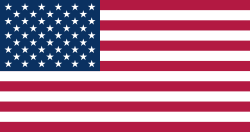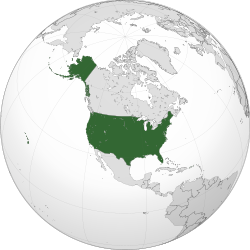
Back Еиду Америкатәи Аштатқәа Abkhazian Amirika Syarikat ACE Америкэ Штат Зэхэтхэр ADY Verenigde State van Amerika Afrikaans USA ALS የተባበሩት የአሜሪካ ግዛቶች Amharic Amilika AMI Estaus Unius AN Geanedan Ricu America ANG अमेरिका ANP
United States of America | |
|---|---|
| Motto: "In God We Trust"[1] Other traditional mottos:[2]
| |
| Anthem: "The Star-Spangled Banner"[3] | |
| Capital | Washington, D.C. 38°53′N 77°1′W / 38.883°N 77.017°W |
| Largest city | New York City 40°43′N 74°0′W / 40.717°N 74.000°W |
| Official languages | English[a] |
| Ethnic groups | By race:
By origin:
|
| Religion (2023)[9] |
|
| Demonym(s) | American[b][10] |
| Government | Federal presidential republic |
| Donald Trump | |
| JD Vance | |
| Mike Johnson | |
| John Roberts | |
| Legislature | Congress |
| Senate | |
| House of Representatives | |
| Independence from Great Britain | |
| July 4, 1776 | |
| March 1, 1781 | |
| September 3, 1783 | |
| June 21, 1788 | |
| Area | |
• Total area | 3,796,742 sq mi (9,833,520 km2)[12][c] (3rd) |
• Water (%) | 7.0[11] (2010) |
• Land area | 3,531,905 sq mi (9,147,590 km2) (3rd) |
| Population | |
• 2024 estimate | |
• 2020 census | |
• Density | 87/sq mi (33.6/km2) (185th) |
| GDP (PPP) | 2024 estimate |
• Total | |
• Per capita | |
| GDP (nominal) | 2024 estimate |
• Total | |
• Per capita | |
| Gini (2023) | medium inequality |
| HDI (2022) | very high (20th) |
| Currency | U.S. dollar ($) (USD) |
| Time zone | UTC−4 to −12, +10, +11 |
• Summer (DST) | UTC−4 to −10[g] |
| Date format | mm/dd/yyyy[h] |
| Calling code | +1 |
| ISO 3166 code | US |
| Internet TLD | .us[18] |
The United States of America (USA), also known as the United States (U.S.) or America, is a country located primarily in North America.[j] It is a federal republic of 50 states and the federal capital district of Washington, D.C. The 48 contiguous states border Canada to the north and Mexico to the south, with the semi-exclavic state of Alaska in the northwest and the archipelagic state of Hawaii in the Pacific Ocean. Indian country includes 574 federally recognized tribes and 326 Indian reservations with tribal sovereignty rights. The U.S. asserts sovereignty over five major island territories and various uninhabited islands in the Pacific Ocean and the Caribbean. It is an ecologically megadiverse country, with the world's third-largest land area[c] and third-largest population, exceeding 340 million.[k]
Paleo-Indians migrated to North America across the Bering land bridge more than 12,000 years ago, and formed various cultures. Spanish Florida, the first European colony in what is now the continental U.S., was established in 1513, and later British colonization led to the first settlement of the Thirteen Colonies in Virginia in 1607. Intensive agriculture in the rapidly expanding Southern Colonies encouraged the forced migration of enslaved Africans. Clashes with the British Crown over taxation and political representation sparked the American Revolution, with the Second Continental Congress formally declaring independence on July 4, 1776. The U.S. emerged victorious from the American Revolutionary War of 1775 to 1783 and expanded westward across North America, dispossessing Native Americans during the Indian Wars. The Louisiana Purchase in 1803 and the end of the Mexican–American War in 1848 saw significant territorial acquisition. As more states were admitted, a North–South division over slavery led to the secession of the Confederate States of America, which fought the Union in the American Civil War of 1861 to 1865. With the Union's victory, slavery was abolished nationally. In the late 19th century and early 20th century, the U.S. established itself as an industrial giant and great power following the Spanish–American War and World War I. After Japan's attack on Pearl Harbor in 1941, the U.S. entered World War II; its aftermath left the U.S. and the Soviet Union as the world's superpowers. During the Cold War, both countries struggled for ideological dominance and international influence. The Soviet Union's collapse and the end of the Cold War in 1991 left the U.S. as the world's sole superpower.
The U.S. national government, as established by the Constitution in 1789, is a presidential republic and liberal democracy with a separation of powers into three branches: legislative, executive, and judicial. The Congress, the national legislature, is composed of the House of Representatives (a lower house based on population) and the Senate (an upper house based on equal representation for each state). The federal system provides substantial autonomy to the 50 states, each with its own constitution and laws. The American political tradition is rooted in Enlightenment ideals of liberty, equality, individual rights, and the rule of law. Since the 1850s, the Democratic and Republican parties have dominated American politics.
A developed country, the U.S. ranks high in economic competitiveness, productivity, innovation, and higher education. The U.S. accounted for over a quarter of nominal global economic output in 2024, and its economy has been the world's largest by nominal GDP since about 1890. It possesses the largest amount of wealth of any country and has the highest disposable household income per capita among OECD countries, though U.S. wealth inequality is one of the most pronounced in those countries. A melting pot of many ethnicities and customs, the culture of the U.S. has been shaped by centuries of immigration, and its soft power influence has a global reach. The U.S. is a member of multiple international organizations and plays a leading role in global political, cultural, economic, and military affairs.
- ^ 36 U.S.C. § 302
- ^ "The Great Seal of the United States" (PDF). U.S. Department of State, Bureau of Public Affairs. 2003. Retrieved February 12, 2020.
- ^ An Act To make The Star-Spangled Banner the national anthem of the United States of America (H.R. 14). 71st United States Congress. March 3, 1931.
- ^ Vivian Ho; Rachel Pannett (March 1, 2025). "A Trump order made English the official language of the U.S. What does that mean?". The Washington Post.
- ^ Luke Broadwater (March 1, 2025). "Trump Signs Order to Designate English as Official Language of the U.S." The New York Times.
- ^ "2020 Census Illuminates Racial and Ethnic Composition of the Country". United States Census. Retrieved August 13, 2021.
- ^ "Race and Ethnicity in the United States: 2010 Census and 2020 Census". United States Census. Retrieved August 13, 2021.
- ^ "A Breakdown of 2020 Census Demographic Data". NPR. August 13, 2021.
- ^ Staff (June 8, 2007). "In Depth: Topics A to Z (Religion)". Gallup, Inc. Retrieved July 1, 2024.
- ^ Compton's Pictured Encyclopedia and Fact-index: Ohio. 1963. p. 336.
- ^ "The Water Area of Each State". United States Geological Survey. 2018. Retrieved January 29, 2024.
- ^ Areas of the 50 states and the District of Columbia but not Puerto Rico nor other island territories per "State Area Measurements and Internal Point Coordinates". Census.gov. August 2010. Retrieved March 31, 2020.
reflect base feature updates made in the MAF/TIGER database through August, 2010.
- ^ "National Population Totals and Components of Change: April 1, 2020 to July 1, 2024". United States Census Bureau. Retrieved December 20, 2024.
- ^ "U.S. Census Bureau Today Delivers State Population Totals for Congressional Apportionment". United States Census. Retrieved April 26, 2021. The 2020 census was held on April 1, 2020.
- ^ a b c d "World Economic Outlook Database, October 2024 Edition. (United States)". www.imf.org. International Monetary Fund. October 22, 2024. Retrieved October 22, 2024.
- ^ "Income in the United States: 2023". Census.gov. p. 53. Retrieved December 15, 2024.
- ^ "Human Development Report 2023/24" (PDF). United Nations Development Programme. March 13, 2024. Retrieved March 13, 2024.
- ^ "The Difference Between .us vs .com". Cozab. January 3, 2022. Archived from the original on April 16, 2023. Retrieved August 11, 2023.
- ^ "China". The World Factbook. Retrieved June 10, 2016.
- ^ "United States". Encyclopædia Britannica. Archived from the original on December 19, 2013. Retrieved January 31, 2010.
Cite error: There are <ref group=lower-alpha> tags or {{efn}} templates on this page, but the references will not show without a {{reflist|group=lower-alpha}} template or {{notelist}} template (see the help page).
© MMXXIII Rich X Search. We shall prevail. All rights reserved. Rich X Search




